- Home
- J. Burchett
Polar Meltdown
Polar Meltdown Read online
Wild Rescue: Polar Meltdown
published in 2011 by
Hardie Grant Egmont
85 High Street
Prahran, Victoria 3181, Australia
www.hardiegrantegmont.com.au
First published by Stripes Publishing
1 The Coda Centre, 189 Munster Road
London SW6 6AW
All rights reserved. No part of this publication may be reproduced, stored in a retrieval system or transmitted in any form by any means, electronic, mechanical, photocopying, recording or otherwise, without the prior written permission of the publishers and copyright holders.
A CiP record for this title is available from the National Library of Australia.
Text copyright © 2009 Jan Burchett and Sara Vogler
Illustrations copyright © 2009 Dianne Le Feyer of Cartoon Saloon
Cover illustration and design © 2011 Hardie Grant Egmont
Printed in Australia by McPherson’s Printing Group
1 3 5 7 9 10 8 6 4 2
FOR POLAR BEARS INTERNATIONAL
FOR ALL THEIR IMPORTANT
WORK ON BEHALF OF THESE
MAGNIFICENT ANIMALS - JB & SV
CONTENTS
CHAPTER ONE
CHAPTER TWO
CHAPTER THREE
CHAPTER FOUR
CHAPTER FIVE
CHAPTER SIX
CHAPTER SEVEN
CHAPTER EIGHT
CHAPTER NINE
CHAPTER TEN
CHAPTER ELEVEN
CHAPTER TWELVE
CHAPTER THIRTEEN
CHAPTER
ONE
“Finished before you!” declared Zoe, hitting enter on the keyboard in front of her. Her result flashed up on the screen: “Animal print identification quiz – 49 out of 50. Congratulations, Wild Operative Zoe Woodward!”
“I’ve got them all right,” boasted Ben, her twin brother, as he finished seconds after her. He looked at Zoe’s results. “Fancy not knowing the shape of the moose hoof!”
“Well, it’s hard,” protested Zoe. “All the deer prints are so alike. I had to guess.”
Ben grinned. “So did I,” he admitted. He pushed his chair back and looked round at the state-of-the-art education centre, with its row of computer terminals and huge resource area full of books and manuals, maps and charts. “This place is so cool,” he said. “In fact, everything we’ve done here at Wild HQ has been awesome. The climbing wall was the best.”
“The water sports were my favourite,” said Zoe. “Especially the canoeing.”
Ben and Zoe were very unusual eleven-year-olds. They were the youngest operatives in Wild, a top-secret organisation dedicated to saving endangered animals. The head of the organisation, their godfather Dr Stephen Fisher, had invited them to spend the Easter holidays at his headquarters hidden deep underground on a remote island. They’d been undertaking a series of exercises to sharpen up their physical and mental skills for future Wild missions – endurance challenges, advanced satellite tracking and finally a series of brain boggling tests.
“I’ll be sorry to go back home,” said Zoe.
“We’ve had a great time,” agreed Ben. “I wish we could stay longer.”
The door slid open and the lanky figure of Uncle Stephen appeared. He was wearing a white lab coat, a straw hat and bright stripy shorts. Zoe tried not to giggle.
“Well done, Ben and Zoe,” he said. “You’ve passed all your challenges with flying colours. Just one last little identification test.”
He tossed them a glass eye. Ben snatched it out of the air before Zoe could get her hands on it. They looked at each other in excitement. They knew what the eye meant. They weren’t going home after all. Uncle Stephen must have a new rescue mission for them!
They peered at the eyeball. This was their uncle’s little clue to get them to guess the animal in danger.
“It’s dark,” said Ben, “and the pupil’s huge.”
“Looks like my old teddy bear’s eye,” joked Zoe.
“You’re getting close,” said Dr Fisher.
“The most endangered bear I can think of is the polar bear,” said Ben.
“Quite right!” Their godfather beamed. “And I’ve got a bear or two in the Arctic that need your help. Come with me to the Control Room.”
Ben and Zoe followed him eagerly along the corridor to the Control Room and placed their fingertips on the ID pad.
“Print identification complete,” came the electronic voice.
The door swung open to reveal the centre of Wild’s Headquarters – a brightly-lit room full of operatives at flashing control panels and busy computer screens.
Uncle Stephen went over to a touch screen and brought up an Internet blog. “This was posted today,” he told them. “It’s from a vet in an Inupiat community in Fairwood, Alaska. I often read Theo Airut’s entries because he sounds a decent bloke who cares for the animals in the area. And it keeps me up to date with events out there. Erika has set the computer to flag up any problems and this certainly got the alarm bells ringing – well, we don’t have actual alarm bells of course, far too noisy.”
Zoe read the blog aloud. “‘A local man brought the body of a polar bear into the village today.’” She sighed. “How sad!”
Ben scrolled down the entry. “‘He’d gone out on a fishing expedition and the bear attacked him. He had to shoot it to save his own life. Then he brought the body back for its fur.’”
“Theo asked to see the body,” Uncle Stephen told them. “He’s posted several recent entries about the bears not getting enough to eat and he wanted to check this one out. It’s very unusual for a polar bear to attack a human, but this one appears to have been starving.” He looked grave. “I’m afraid global warming is taking its toll on their numbers. I’m sure you’ve heard all about the polar ice cap getting thinner.”
Ben and Zoe nodded.
“Seals normally build their birth lairs in the thick ice shelves, but because the ice has been thinner these last few years the seals can’t breed as well.”
“And seals are the main source of food for polar bears,” said Zoe.
“Indeed.” Uncle Stephen nodded. “The seals are full of fat, which in turn gives the polar bear a thick fat layer. This keeps them warm and enables them to go without food for long periods.”
“Wait a minute,” said Ben, puzzled. “If this bear’s already dead, what’s our mission?”
“The vet’s examination showed something particularly worrying,” Uncle Stephen continued. “The dead bear was a lactating female.”
“That’s awful!” gasped Zoe. “It means there could be motherless cubs out there in the wild.”
“The Arctic can be a very hostile terrain,” said Dr Fisher. “This mission will be your most difficult yet. You need to find those cubs before it’s too late.”
CHAPTER
TWO
Ben and Zoe gazed at each other in excitement. This was like nothing they’d ever done before.
“Any clues to where we should look?” asked Zoe.
“The blogger didn’t say where the bear attacked,” said Uncle Stephen. “That’s something you’ll have to find out when you get there.”
“I don’t suppose she would have strayed far from her cubs,” said Ben thoughtfully. “Polar bears build birthing dens, don’t they? They make them in the snow on the land and stay in them for months.”
“They do,” said Uncle Stephen.
“So we find out where the attack took place and start our search there,” said Zoe.
“Exactly,” said Uncle Stephen. “Most bears give birth in December and January – usually to twins – and when the cubs are about two or three months old they start bringing them out. So our little orphans cou
ld have started exploring, but they’ll still be dependent on their mum for milk.”
The door opened and a smiling young woman with a ponytail came in. It was Erika Bohn, Dr Fisher’s second-in-command.
“I’ve just got the latest weather reports for Fairwood,” she told them. “Minus twenty degrees centigrade with snow showers.”
“Minus twenty!” gasped Zoe. “That’s incredibly cold. And won’t it be dark most of the time?”
“It would be in the depths of winter,” Erika explained. “But as it’s March there’ll be about twelve hours of daylight, like here.”
She tapped a screen and brought up a map of the Arctic Circle.
“Here’s Fairwood,” she said, zooming in on the northern coast of Alaska. “That’s the village where the fisherman lives. I’ll take you there so you can find out more from him. Eager questions from a couple of kids won’t look suspicious. I’m going to pretend to be your mother and we’ll be tourists.”
“Then you two will head off to search for the bear cubs while Erika goes further along the coast,” put in Uncle Stephen.
“There’s a new oil drilling project being proposed in the Arctic near to Fairwood,”
Erika told them. “We’re fearful that pollution from the drilling will add to the problems that global warming is already causing for the animals there. I’m going to investigate.”
“You’ll be needing my latest invention, of course,” said Uncle Stephen, proudly pulling out a small crate from under a workstation and rummaging around inside. “I’m very excited about my RAT.”
With a flourish, their godfather pulled out two streamlined snowboards with micro-sized engines at the back. They were about half the size of a normal skateboard and folded in half for packing. The children had never seen anything like them.
“The RAT,” he explained. “The Rapid Arctic Traveller. I’ve made them from a special ultra-bonded polyurethane I’ve developed. They’re so strong an elephant could use them – if it could get its feet in the footholds. And the beauty is they’re made entirely from recycled materials.”
He placed one on the ground and stood on it, kicking the engine into life with his heel.
“Dr Fisher!” warned Erika. “Remember what happened last time you tried it out.”
“I thought I’d be safe in the corridor,” protested Uncle Stephen, as the RAT wobbled dangerously. “I didn’t know that James was about to come out of the staff restaurant with a tray of yoghurts.”
“I wish I’d seen that!” said Ben.
“I rather resembled a milkshake afterwards,” admitted their godfather, reluctantly stepping off the RAT.
“It’s just like skateboarding,” said Erika. “And I know you two are experts at that. The RAT power-glides across the snow. It’s very flexible and copes with bumpy terrain. The engine runs on batteries, solar powered of course, and it will keep going for forty-eight hours without a boost.”
“Awesome!” gasped Ben.
“I can’t wait to try it out,” exclaimed Zoe, taking one in her hands. “It’s so light.”
“And now for the rest of your equipment,” said Erika. “You’ll be needing your BUGs and suitable clothing.” She opened a drawer and handed them two small devices. The BUGs, short for Brilliant Undercover Gizmos, looked like handheld games consoles to anyone who didn’t know. They were, in fact, sophisticated machines that did a whole range of things from satellite mapping to animal tracking.
“I wouldn’t want to go without this,” said Ben, scrolling through the menu.
Uncle Stephen chuckled. “Don’t forget to pack your long johns – they’ll be just as vital as your BUGs on this chilly mission.”
Erika led Ben and Zoe over to the stockroom.
The Wild stockroom was an Aladdin’s cave of marvellous technological devices, clothes for every possible climate, and various half-finished inventions of Uncle Stephen’s, full of wires and springs.
Erika pulled two backpacks off a shelf. “I’ve already put a tent in one of these,” she told them. “And your ultra-light thermal sleeping bags.” She then took two baby bottles and some powdered milk from a wall cupboard.
“This is specially formulated to match the rich milk of a polar bear mother,” she said. “Now pass those white bundles, please, Zoe.”
“What are they?” asked Zoe, pulling two furry fleeces out of a box.
“Slings,” said Uncle Stephen, appearing in the doorway. “When you find the cubs you’ll need something to carry them in.
They’ll be about the size of large cats by now. The fur will make them think you’re their mother. We don’t want them to get used to humans.”
The children stashed the slings in their backpacks, and Dr Fisher showed them the special side pockets that kept the folded RATs hidden from view. Erika made two piles of clothes for them to take.
“Looks as if Erika’s getting you to pack everything but the kitchen sink!” laughed Uncle Stephen. “She’s right, though. You must be prepared for the worst the weather can throw at you out there.”
Erika grinned at him as she picked up two pairs of goggles.
“These are specially designed for the Arctic,” she said. “They act as snow goggles, which you will find essential, but when you press the logo here…” she touched the small symbol on one side and immediately the lower half of the glass darkened, “…that part becomes thermogoggles.” Erika handed the goggles to Ben and Zoe.
“Awesome!” said Ben.
Ben and Zoe hoisted their backpacks on to their shoulders and slung their Arctic clothing over their arms.
“We’re ready!” declared Zoe.
“Good luck,” said Uncle Stephen. “I’ll start looking for somewhere that takes polar bear orphans.”
Ben turned to face Zoe. “Come on, what are we waiting for? We’ve got bear cubs to save!”
CHAPTER
THREE
Erika brought the aeroplane down on the landing strip of the little airport at Fairwood, Alaska. It was a bright morning and the sun glinted on the snow that lay all around.
“It’s eleven o’clock here,” said Ben. “So the flight was only seven hours! This is a fantastic plane.”
“Your uncle’s very pleased with his new design.” Erika smiled as she took off the pilot’s headset. “It’s all made from recycled products, but it still looks like an ordinary private jet. You’re the first passengers.”
“I see he’s still using chicken poo in his special fuel,” said Zoe, wrinkling her nose.
Everything at Wild was run on eco-friendly – but rather pongy – fuels.
“But there’s something else,” added Ben. “It doesn’t quite smell the same.”
“Well spotted,” said Erika. “He put egg yolks in the mixture. That makes for a much more efficient fuel.”
“Certainly makes it faster!” said Zoe.
They picked up their bulging backpacks.
“Hats, gloves, everything on before I open the door,” instructed Erika. “And don’t take anything off while you’re outside. Frostbite can hit in minutes.”
The children were wearing fleecy tracksuits and long underwear. Now they zipped themselves into white padded waterproof trousers and jackets, and pulled on their balaclavas and gloves.
“Warm as toast!” Ben grinned.
They stepped down on to the tarmac. Their breath made clouds in the freezing air.
“It’s so cold!” gasped Zoe, looking round the desolate airstrip with its single building that rose from the flat snow all around. “The air’s even freezing the inside of my nose!” She tried not to think about the poor cubs huddled in their den, waiting in vain for their mother to return.
“Follow me,” said Erika briskly, heading off towards the airport offices. “Once we’re through passport control our taxi will be arriving to take us to the Inupiat Heritage Center. It’s a good starting place to find out the information we need.”
They were soon waiting outside the airport. In the distan
ce across the white landscape they could just make out a cluster of houses.
Ben was peering down the snow-covered road, marked out by its row of telegraph poles. “I think I’ve just spotted our taxi,” he said, “and it’s awesome!”
Zoe gasped as she followed his gaze. A large sledge was gliding towards them, pulled by a team of eager huskies. The sledge drew alongside and the huskies stood panting as a short, stocky man dressed in fur-trimmed animal skin jumped down.
“Miss Bohn?” he enquired with a broad smile.
Erika smiled back and nodded. “And these are my children, Ben and Zoe.”
“Welcome to Alaska,” said the man. He spoke with an American accent. “My name’s Charlie.”
Ben and Zoe went over and admired the sledge.
“This is going to be great!” exclaimed Zoe. “Shall we get in, Mum?”
The children gave each other a secret grin. They were used to Erika taking on different roles for their missions, but it was funny to pretend she was their mother.
“Oh course, dear,” Erika replied. “But no pushing and shoving.”
The children scrambled aboard, settled themselves on the long bench and covered their legs with a blanket.
Zoe kept her eye on the dogs. One of them looked younger and fluffier than the others and it was rolling in the snow, getting tangled in its chain.
“How sweet!” She sighed. “I just want to hug it.”
“Zoe’s having an attack of gooeyness,” groaned Ben.
“Leave your sister alone,” said Erika, rolling her eyes at Charlie.
They watched him say a few sharp words to the dog.
“That one’s just finished her training,” he told them, as he climbed into the sledge. “She’ll be really good when she settles down.”
One or two of the huskies were already howling in their impatience to get going, and he urged them forwards with some words the children didn’t understand. The sledge glided over the snow in a wide arc and then set off in its previous tracks.
The landscape was very flat and the snow lay deep and undisturbed. One solitary bare tree was growing on a small mound.

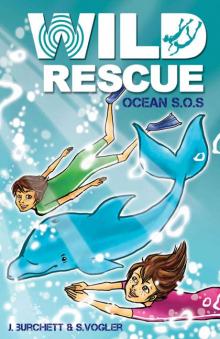 Ocean SOS
Ocean SOS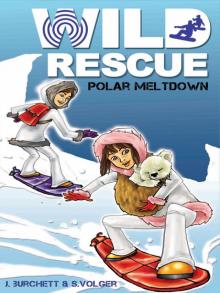 Polar Meltdown
Polar Meltdown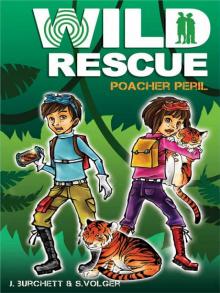 Poacher Peril
Poacher Peril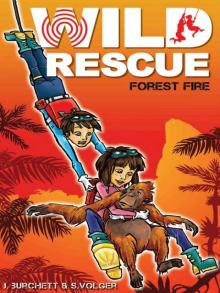 Forest Fire
Forest Fire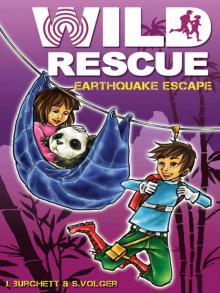 Earthquake Escape
Earthquake Escape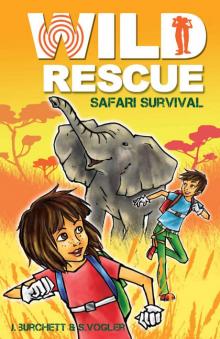 Safari Survival
Safari Survival